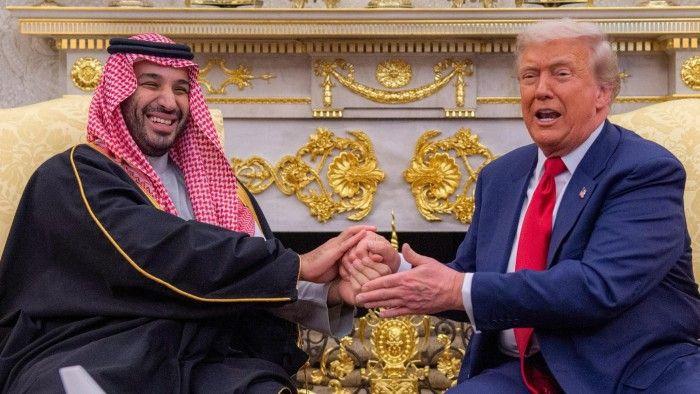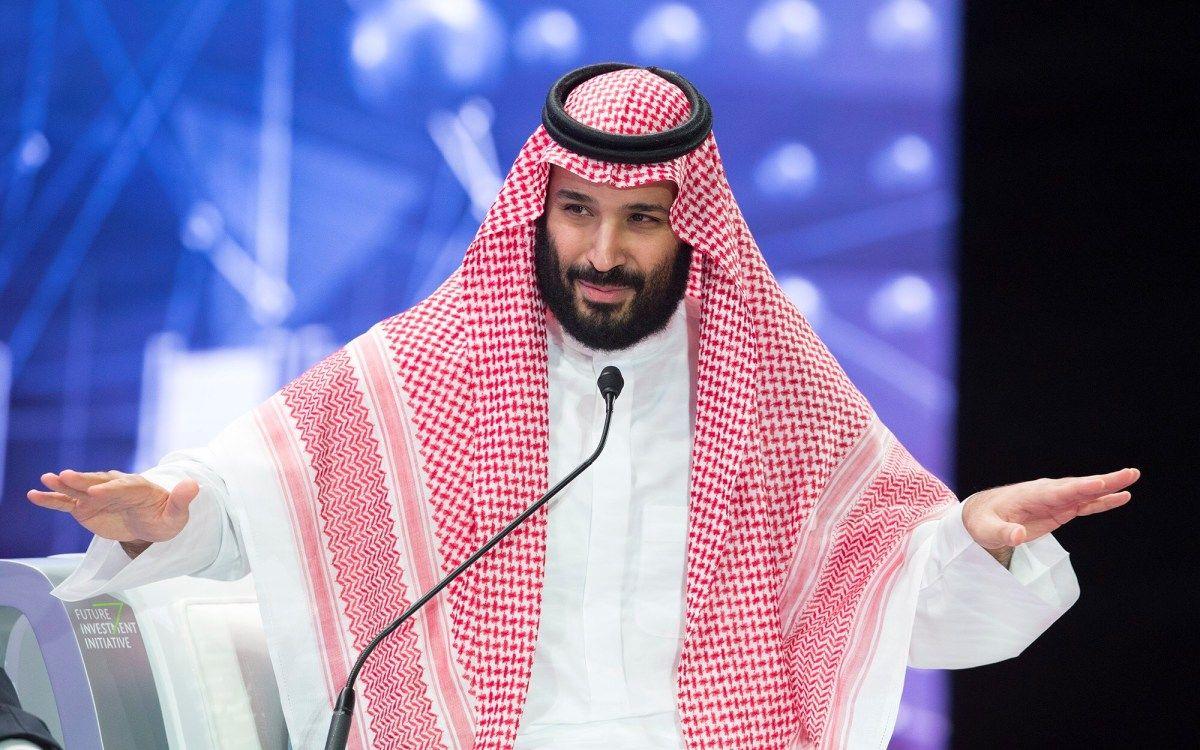Saudi Arabia Leads $900M Funding Round in Luma AI as Kingdom Expands AI Ambitions
2 Sources
2 Sources
[1]
Saudi Arabia leads $900mn funding round in Luma AI as US ties deepen
Saudi Arabia is backing a $900mn funding round in US video start-up Luma AI, as the Gulf state steps up efforts to become a global force in the development of artificial intelligence. The deal, led by Humain, the AI-focused venture backed by the kingdom's sovereign wealth fund, values Luma at more than $4bn, according to people close to the negotiations. The deal will be announced in Washington at this week's US-Saudi Investment Forum, led by Crown Prince Mohammed bin Salman as part of a number of new deals with US companies. Those follow a wave of tie-ups announced during Donald Trump's visit to Riyadh in May. Saudi Arabia wants to use the financial muscle of its near-$1tn Public Investment Fund to become an international leader in AI. Prince Mohammed said during his meeting with the US president in the Oval Office on Tuesday that his country planned to spend about $50bn on AI "in the short term". Luma, which is based in Burbank, California, creates generative video models that can respond to prompts to create movies or simulate reality. The new funding will accelerate Luma's efforts to train large-scale "world models" that learn from videos and robotic data rather than just language. Big Tech groups such as Google DeepMind and Meta, as well as start-ups such as Fei Fei Li's World Labs, are spending billions of dollars in the race to build these new "spatial intelligence" systems. Amit Jain, co-founder of Luma, said: "To create AI that can help humanity in the physical world and expand our understanding of the universe, we need to build systems that can learn from a quadrillion tokens of information -- roughly the collective digital memory of humanity -- contained in video, image, audio and language." Meanwhile, Humain is building Project Halo, one of the world's largest data centre clusters that will provide some computational power for Luma. The deal includes an initiative to build AI models trained on Arabic and regional data to create "culturally aligned" AI. Existing investors, such as Andreessen Horowitz, Amplify Partners and Matrix Partners have also participated in Luma's new funding round, alongside new investors including AMD Ventures. Saudi Arabia and PIF have recalibrated their spending and priorities as lower oil prices put pressure on the kingdom's budget in recent years. But AI remains one of the main areas where it is willing to spend as part of wider plans to diversify the economy away from its dependence on oil revenues. Humain chief executive Tareq Amin told the Financial Times earlier this year that the company had allocated $10bn for AI investments through a venture capital fund, while it continued talks with Nvidia and other semiconductor companies to secure the chips needed to build data centres in the kingdom.
[2]
Saudi Arabia Leads Effort to Pour $900 Million Into Hollywood AI Firm, Giving Kingdom a Foothold In Future of Entertainment
Why a Top Hollywood Exec Became an AI Evangelist: A "Tidal Wave" Is Coming Hollywood-oriented AI is getting a major boost from the Saudi government, which is expected to announce Wednesday that it will anchor a $900 million funding round for Luma AI, the San Francisco company building models meant partly for entertainment. Humain, the AI company backed by Saudi's PIF, will be the lead investor in Luma AI's latest funding round, which also includes powerhouse VC Andreessen Horowitz as well as early-stage investors Amplify Partners and Matrix Partners.. The size of Humain's stake was not disclosed, but principals described it as significant. The infusion greatly increases the capital coming into Luma, which in a few previous rounds from the lkes of AWS, a16z and Nvidia totaled just $70 million. As part of the deal Luma will have access to large Saudi-based data centers that aim to generate 2 gigawatts of computing power, roughly enough to power a mid-size city for a year. Luma will also open a Riyadh office. "The sheer capacity and compute in Saudi Arabia is different from anywhere in the world," Luma AI chief executive Amit Jain told The Hollywood Reporter ahead of the announcement, which is expected to be made at the Kennedy Center with a host of Saudi and American leaders as part of a larger set of deals between the countries. "This will allow us to do so many new things." Jain said the capacity and cash would be used to power "world models," the vogueish idea in AI that the tech can map onto the physical world in order to understan human intelligence in a more intuitive way. While Large Language Models use prediction techniques to create video and images in addition to text, world models can, to their supporters, understand spatial and other reasoning in a way that would make them much more practically useful, though there is yet little real-world evidence that they can do this. Jain said the world models Luma will build would have many use cases in Hollywood, including the creation of new work. "With a world model you make a 90-minute movie not just look like an Oscar winner visiually but in story, in flow," he said. "You can iterate and go back and forth and it will have memory, something an LLM doesn't have." But the sheer computing power, while necessary, may or may not be sufficient to reach the level of artistic reasoning that such promises require. The investment in such models is also likely to rankle many creatives in Hollywood, who are concerned about a huge influx of capital to efforts that could reduce their own ability to make a living. While OpenAI and Google have garnered mainstream attention, Luma is one of a small number of of video-centric companies that have been garnering attention in the filmmaking world, thanks to backdrop-shifting tools like Modify and the viral short-generator Dream Machine last year. Jain said he plans to make Luma's world models available to Hollywood studios. The company recently opened a lab in Los Angeles to try to educate directors and executives on AI usage. He said 2027 was the target but 2028 was the more likely date for the full capacity of the Saudi data centers. As Crown Prince Mohammed bin Salman makes a state visit to the White House, Saudia Arabia is seeking to become an AI powerhouse, leveraging its large open spaces and access to cheap energy to become an exporter of computing power. Earlier this year MBS created Humain as the official government-based AI company, not dissimilar to the oil-based Aramco. Oracle, Amazon, Microsoft and Elon Musk's Grok have all reportedly met with Humain leadership. Backed by Saudi's PIF, the company's CEO, Tareq Amin, previously led Aramco's digital efforts. But questions remain about American companies doing business with Saudi given the country's spotty record on human rights. Just seven years ago, after the death of Washington Post columnist Jamal Khashoggi at what U.S. intelligence officials wound up concluding was an act approved by bin Salman, Endeavor returned its $400 million investment from Saudi under heavy public pressure. Much of that resistance has evaporated as the Trump administration has aggressively sought to be in business with MBS and make deals to benefit American tech companies, like a deal earlier this year for Nvidia to sell coveted AI chips to Humain in exchange for massive Saudi investment in data centers. Families of 9/11 victims and Khashoggi's widow Hanan Elatr Khashoggi have raised their objections this week to the Crown Prince's visit and the business arrangements, but asked about that by an ABC News correspondent Trump brushed off the 9/11 question and responded "things happen" about the Khashoggi murder after berating her as a "terrible person." MBS, he said, has done a "phenomenal job." The Luma deal continues PIF's entrees into entertainment, which included the recent backing of a deal to buy gaming company EA for $55 billion. Jain said his deal grew out of a personal relationship he with Amin, the Humain leader. In a statement the Saudi exec praised Jain's company. "Luma AI is an exceptional U.S.-based global frontier startup pushing the boundaries of multimodal world models. Their technical ambition, research velocity, and proven ability to turn foundational breakthroughs into real products make them uniquely aligned with Humain's vision," he said. For his part, Jain said that he was focused on Human and Luma, which he said were "strategically aligned." He said he personally found Saudi Araba to be a "very vibrant country" where "young people were extremely driven to try to do great things," thanks to that youthful demographic and general spirit of entrepreneurship. Though the money for the investment comes from the government, he said he didn't see this as a political deal. "I don't have reservations," he said when asked about the Saudi government's checkered history. "This is a very fruitful partnership where we can build something that will bring this incredible technology to the world."
Share
Share
Copy Link
Saudi Arabia's Humain leads a massive $900 million funding round for Luma AI, valuing the video generation startup at over $4 billion. The deal strengthens US-Saudi AI partnerships and positions the kingdom as a major player in artificial intelligence development.

Major Investment Signals Saudi AI Ambitions
Saudi Arabia is making a significant push into artificial intelligence with a $900 million funding round in US video startup Luma AI, marking one of the largest AI investments by the Gulf kingdom. The deal, led by Humain, the AI-focused venture backed by Saudi Arabia's sovereign wealth fund, values Luma at more than $4 billion according to people close to the negotiations
1
.The investment represents a dramatic increase in capital for Luma, which had previously raised just $70 million across multiple funding rounds from investors including AWS, Andreessen Horowitz, and Nvidia
2
. The deal was announced at this week's US-Saudi Investment Forum in Washington, led by Crown Prince Mohammed bin Salman as part of several new partnerships with American companies.Strategic Partnership with Computing Infrastructure
As part of the agreement, Luma AI will gain access to large Saudi-based data centers that aim to generate 2 gigawatts of computing power, roughly enough to power a mid-size city for a year
2
. The company will also establish a Riyadh office to strengthen its presence in the region."The sheer capacity and compute in Saudi Arabia is different from anywhere in the world," Luma AI CEO Amit Jain told The Hollywood Reporter. "This will allow us to do so many new things"
2
.Humain is simultaneously building Project Halo, described as one of the world's largest data center clusters, which will provide computational power for Luma's operations
1
.Focus on World Models and Entertainment Applications
Luma, based in Burbank, California, creates generative video models that respond to prompts to create movies or simulate reality. The new funding will accelerate the company's efforts to train large-scale "world models" that learn from videos and robotic data rather than just language
1
.These world models represent a significant advancement in AI technology, with the potential to understand spatial and other reasoning in ways that could make them more practically useful than current large language models. Jain explained that world models could enable the creation of feature-length films with sophisticated storytelling capabilities, stating: "With a world model you make a 90-minute movie not just look like an Oscar winner visually but in story, in flow"
2
.Related Stories
Broader Saudi AI Strategy
The investment aligns with Saudi Arabia's broader ambitions to become a global AI powerhouse. During his meeting with President Trump, Crown Prince Mohammed bin Salman indicated that the kingdom planned to spend approximately $50 billion on AI "in the short term"
1
.Humain CEO Tareq Amin previously told the Financial Times that the company had allocated $10 billion for AI investments through a venture capital fund, while continuing discussions with Nvidia and other semiconductor companies to secure chips needed for data center construction in the kingdom
1
.The deal includes an initiative to build AI models trained on Arabic and regional data to create "culturally aligned" AI systems, demonstrating Saudi Arabia's commitment to developing AI that reflects regional values and languages
1
.References
Summarized by
Navi
Related Stories
Saudi Arabia's Humain Unveils $10 Billion VC Fund and Ambitious AI Infrastructure Plans
28 May 2025•Business and Economy

Saudi Arabia Launches Multibillion-Dollar AI Venture 'Humain' Amid High-Profile Tech Summit
12 May 2025•Business and Economy

Luma AI Secures $900 Million Funding to Build World's Largest AI Supercluster in Saudi Arabia
19 Nov 2025•Business and Economy

Recent Highlights
1
Google Gemini 3.1 Pro doubles reasoning score, beats rivals in key AI benchmarks
Technology

2
Pentagon Summons Anthropic CEO as $200M Contract Faces Supply Chain Risk Over AI Restrictions
Policy and Regulation

3
Canada Summons OpenAI Executives After ChatGPT User Became Mass Shooting Suspect
Policy and Regulation





